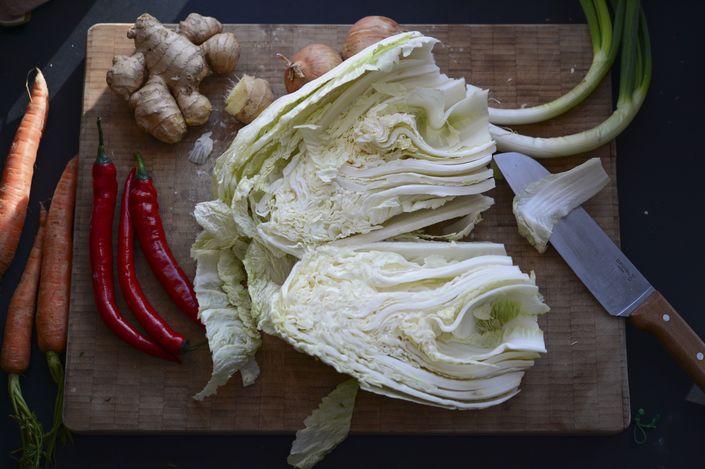
Vegetable Fermentation
Various Tasty Preservation Techniques
Create New Flavors and Complex Tastes!
Boost Your Immune System and Microbiome through Lactic Acid Fermentation!
In this course will learn various methods to take practically every vegetable imaginable and transform it into healthy, delicious flavor explosions to go along with every meal.
Use this course and information as your springboard into the world of vegetable fermentation and probiotics. We will go over how you can get the highest probiotic count in your veggies. And for those who do not enjoy careful measurements all the time - tips how to simply do it by feeling!
We will work with natural yeasts and sugars from vegetables and fruits, as well as learn some 'backslopping' techniques.
Keep your eyes tuned as these courses continuously grow!

Vegetable Fermentation
Various Tasty Preservation Techniques
Course Curriculum
-
PreviewWhat is the Microbiome and Why Should You Care? (3:36)
-
PreviewFermentation - What is it and why should you care (2:20)
-
StartAerobic Vs Anaerobic Fermentation (1:50)
-
StartSALT - which one is the best? (0:47)
-
StartKraut Weights (0:50)
-
StartPickeling Vs Fermenting (1:11)
-
StartBlue Garlic - Good or bad? (0:35)
-
StartIntroduction to Vegetable Fermentation (0:49)
-
StartBenefits of Lacto Fermentation (1:35)
-
PreviewThe Bacterial Succession Explained
-
StartFood as a Medicine
-
StartTutorial - Mixed & Massaged Technique (24:00)
-
StartTutorial - How to make Brined Veggies (14:09)
-
StartTutorial - How to make a Dry Ferment (7:31)
-
PreviewFermented Vegetable Lingo: A to Whey
-
StartBRINE- what is it & how to use it (1:52)
-
StartHot Sauce - the original technique (7:58)
-
StartGolden Kraut - Mixed & Massaged
-
StartPinkchi (2:10)
-
StartLacto-Fermented Salsa
-
StartMustard - yes... real living mustard. BOOM = flavor bomb
-
StartRelish
-
StartLacto Fermented Fruit Chutney
-
StartPreserved Lemons & Probiotic Salad Dressing Ideas
-
StartProbiotic Pickled Eggs
-
StartBONUS: Fire Cider from our immune booster course! (0:51)
-
StartPickles and Tricks to keep them crunchy (0:56)
-
PreviewFusion Spice Pickles (0:27)
-
StartFermented Onions (1:06)
-
StartWild Garlic Pesto with Salted Lemons
-
PreviewLacto-Fermented Sourdough Green Beans
-
StartUmeboshi - Salted Fermented Dried Plums
-
StartSalted Oranges and Peels
-
StartFermented Watermelon Rinds (0:43)
-
StartUrban Foraging Pickles and Ferments (1:58)
-
StartMore recipes always coming...
Frequently Asked Questions
Your Instructor

Alexis first stepped into the world of fermentation in Mozambique. Her stomach was struggling to cope with all the foods her body was not accustomed to. Locals urged her to place her trust in fermented corn drink, called Maheu, claiming it would help her digestive system acclimatize to the foreign bacteria. Always open to try new things, she took their advice and realized that there was more to this sour, tangy drink than she thought. Eight years later, she’s travelled to 43 countries and counting and her gut’s microbiome is the core of her calling. She has collected techniques, understandings and the bacteria and yeasts themselves in order to share the traditional practices of fermentation through interactive workshops, webinars, and online courses. Alexis has studied gut-health and explains the link of the gut-brain connection through the use of fermented foods. She gets her participants to relook at the good old saying 'you are what you eat' (or rather 'you are what you digest') as well as 'follow your gut feeling'.
Why Edible Alchemy?
Edible - you can eat it, and Alchemy - the same philosophy as the alchemists; turning normal things into gold! Here at Edible Alchemy, we change basic foods into more valuable foods. For example, fermented foods are more valuable in their taste. Think of how a normal cabbage can turn into a rich sauerkraut or kimchi. Fermented foods are also more valuable in the amount of time they can last and can be even stabler than their raw ingredients. Aged cheddar anyone? Depending if you are making of buying ferments, we can see fermented foods also are simply more valuable in terms of price in most cases, such as a bunch of grapes that ferment into a bold, round wine. Depending on your desired outcomes, fermented foods can have an appreciable amount of alcohol, which if that is your goal, they too become valued in these qualities. lastly, but not at all least, fermented foods are valuable in nutritional benefit for our bodies!
Fermented foods are nutrient dense foods, which means PACKED with vitamins, nutrients and often with probiotics which help us breakdown our foods better, gain energy, strengthen our immune systems and better our digestions. That's only the tip of the iceberg here. Check out more throughout the courses we have here and see what tantalizes your tastebuds and makes your microbiome (your internal fermentation vessel) get excited and happy!
